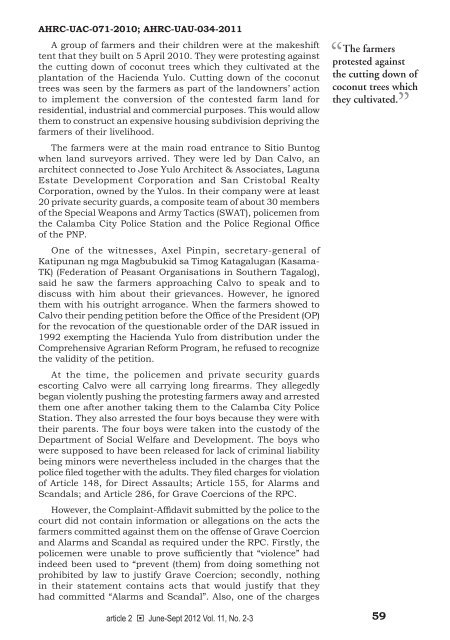Create successful ePaper yourself
Turn your PDF publications into a flip-book with our unique Google optimized e-Paper software.
AHRC-UAC-071-2010; AHRC-UAU-034-2011<br />
A group of farmers and their children were at the makeshift<br />
tent that they built on 5 April 2010. They were protesting against<br />
the cutting down of coconut trees which they cultivated at the<br />
plantation of the hacienda yulo. Cutting down of the coconut<br />
trees was seen by the farmers as part of the landowners’ action<br />
to implement the conversion of the contested farm land for<br />
residential, industrial and commercial purposes. This would allow<br />
them to construct an expensive housing subdivision depriving the<br />
farmers of their livelihood.<br />
The farmers were at the main road entrance to Sitio Buntog<br />
when land surveyors arrived. They were led by Dan Calvo, an<br />
architect connected to Jose yulo Architect & Associates, Laguna<br />
Estate Development Corporation and San Cristobal Realty<br />
Corporation, owned by the yulos. In their company were at least<br />
20 private security guards, a composite team of about 30 members<br />
of the Special weapons and Army Tactics (SwAT), policemen from<br />
the Calamba City Police Station and the Police Regional Office<br />
of the PnP.<br />
One of the witnesses, Axel Pinpin, secretary-general of<br />
Katipunan ng mga magbubukid sa Timog Katagalugan (Kasama-<br />
TK) (Federation of Peasant Organisations in Southern Tagalog),<br />
said he saw the farmers approaching Calvo to speak and to<br />
discuss with him about their grievances. however, he ignored<br />
them with his outright arrogance. when the farmers showed to<br />
Calvo their pending petition before the Office of the President (OP)<br />
for the revocation of the questionable order of the DAR issued in<br />
1992 exempting the hacienda yulo from distribution under the<br />
Comprehensive Agrarian Reform Program, he refused to recognize<br />
the validity of the petition.<br />
At the time, the policemen and private security guards<br />
escorting Calvo were all carrying long firearms. They allegedly<br />
began violently pushing the protesting farmers away and arrested<br />
them one after another taking them to the Calamba City Police<br />
Station. They also arrested the four boys because they were with<br />
their parents. The four boys were taken into the custody of the<br />
Department of Social welfare and Development. The boys who<br />
were supposed to have been released for lack of criminal liability<br />
being minors were nevertheless included in the charges that the<br />
police filed together with the adults. They filed charges for violation<br />
of Article 148, for Direct Assaults; Article 155, for Alarms and<br />
Scandals; and Article 286, for grave Coercions of the RPC.<br />
However, the Complaint-Affidavit submitted by the police to the<br />
court did not contain information or allegations on the acts the<br />
farmers committed against them on the offense of grave Coercion<br />
and Alarms and Scandal as required under the RPC. Firstly, the<br />
policemen were unable to prove sufficiently that “violence” had<br />
indeed been used to “prevent (them) from doing something not<br />
prohibited by law to justify grave Coercion; secondly, nothing<br />
in their statement contains acts that would justify that they<br />
had committed “Alarms and Scandal”. Also, one of the charges<br />
article 2 � June-Sept 2012 Vol. 11, No. 2-3<br />
“<br />
The farmers<br />
protested against<br />
the cutting down of<br />
coconut trees which<br />
they cultivated.”<br />
59


